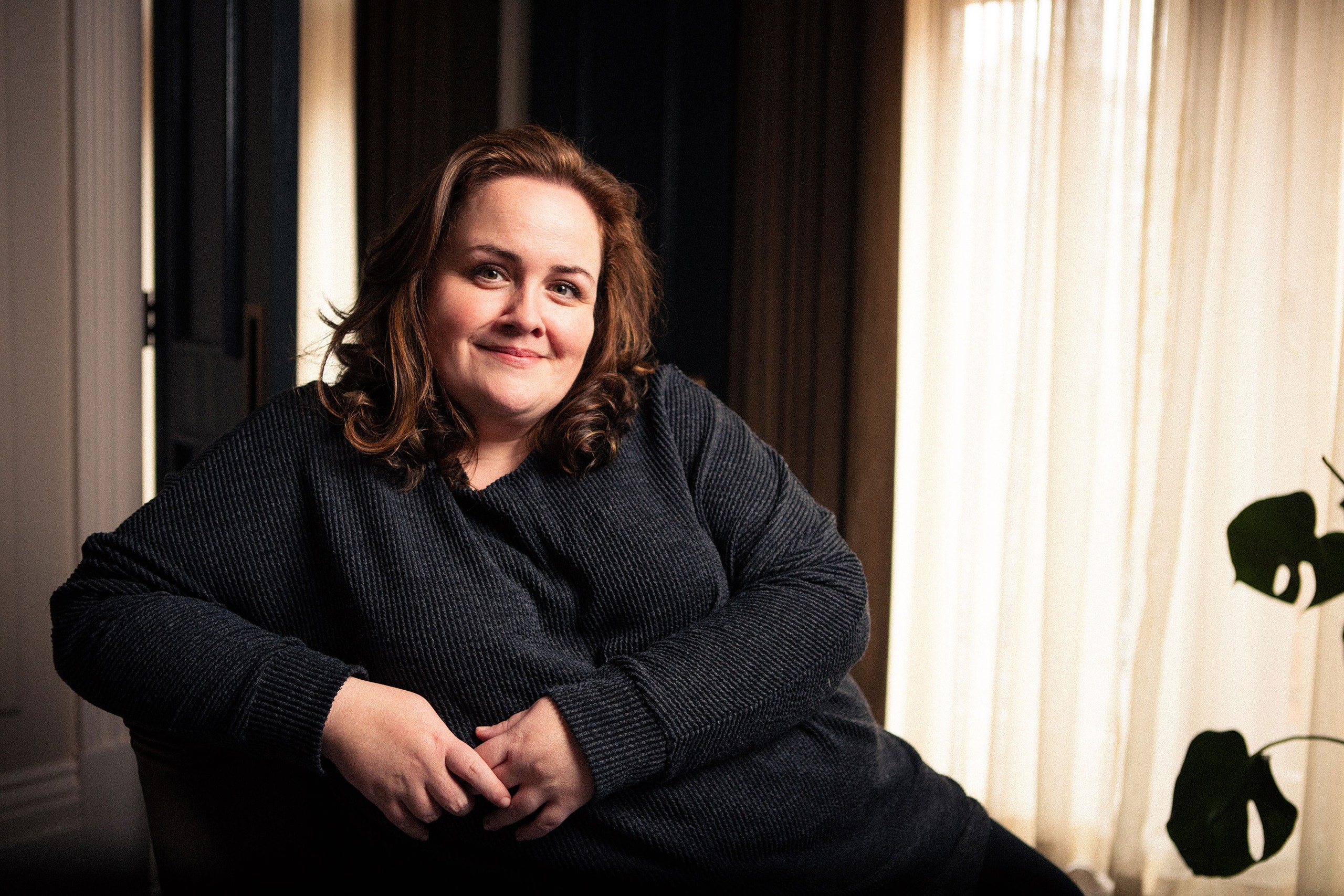“Have you ever just wanted to zip someone open and climb inside them?”
To Jessica Gunning, that line from Richard Gadd’s script for Baby Reindeer was one of the most romantic things she’d ever read. But to the friend who was helping her read through the script for her audition, it sounded completely nuts. “I really was surprised and I really had to check myself because I never in a million years read it as crazy at all,” Gunning tells Vanity Fair. “I thought it was a really lovely thing to say to somebody. I just thought, Isn’t it sweet that she wants to snuggle away inside him?”
The British actress nabbed the role of Martha, a woman who becomes obsessed with a bartender/aspiring comedian (played by Gadd), in part because of her empathetic view of the character. A lesser actor could have played Martha as a straight villain, but Gunning never saw her that way. “I think you have to try and find the person in there and the logic and honesty to what she does, and I really saw it really clearly as soon as I read the script,” she says.
Gadd’s script for the breakout Netflix series—an adaption of his one-person play—is inspired by his own life, following him as he meets a woman in the bar where he works, pays attention to her, and eventually becomes the target of her intense stalking. The dark story also looks back at Gadd being sexually abused by his mentor, exploring mental health issues and trauma with nuance and care. We also see this delicate touch in the characterization of Martha, who is at times charming, funny, caring, and lonely—but can quickly swing into dark and scary places.
For Gunning, who has been working steadily for the past 17 years—appearing in British series like Doctor Who and The Outlaws, and the 2014 BAFTA-nominated film Pride—playing Martha has been the role of a lifetime. She spoke with Little Gold Men (read or listen below) the day after she learned she had earned her first Emmy nomination (Baby Reindeer nabbed 11 nominations total), reminiscing about landing the role after multiple auditions, what sort of (strange) offers she’s getting now, and how she’s avoided being pigeonholed during her 17-year acting career.
Vanity Fair: You had to audition four or five times for this part. What was that process like for you?
Jessica Gunning: Usually if I get a script, I think, “Well, if I’m right for this, I’m right for it.” And I go in and I can usually put it to bed after I come out and think, “Well, what will be will be if, if I’m right.” But for Baby Reindeer, I just felt like I really understood what Richard wanted from the part. I had like a few little indicators early on. When I first had the first audition with Richard and [director] Weronika [Tofilska], I got a really great vibe from the room. In hindsight, I’ve learned that they were kind of always championing me. I’m about four or five years younger than they needed Martha to be, and I’d heard that was one of the concerns in terms of the chemistry reads. I was speaking to a friend of mine, who’s actually now won an Oscar—Nadia Stacey, she did the makeup design for Poor Things—she was like, “I would just put a wig on, I’d go and tape yourself.” So we did that in a very rushed way. Richard, in hindsight, I think, found it incredibly funny that I would go to those extents. I just kept thinking that if this part gets into the hands of somebody that sees her as bad or a villain, then it would be a real shame because I think she’s so much more than that.
Where else did you find inspiration from for your portrayal? Are there women in your life or literature that you looked at?
I did a little bit of research into this thing called limerence—which is a kind of obsession with obsession. It’s in everybody, really. Everyone has the potential to do it. If you meet somebody for the first time, you fill in gaps that aren’t necessarily there, and then when they say something out of character, you’re like, “That’s not you,” but then realize that it’s just the version of them that you’ve painted in your head. Naturally we do that when we’re attracted to somebody or connected to somebody. But limerence takes it to the next level. And I think it might be a similar thing to what Martha has with Donny.
In the series, Donny says that Martha’s laugh was one of the things he loved about her. Is her laugh your laugh, or how did you decide what it would sound like?
It’s like a heightened version of my laugh. So much so that if I laugh now…well, I went to see a comedian and it was in a cabaret setting, and I was with a friend of mine and she was like, “You better not find him too funny.” I should have thought that in advance. Because I do find lots of things funny, so occasionally I’ll see people jolt if I’m at a comedy club, yeah. But I really wanted to make sure it felt authentic and not comical or too cartoony or over the top—still believable, but big enough to cause attention.
Outside of the script, what helped you step into character, whether that was costume or something that was improvised?
That passage of time in episode one, where there’s loads of entrances: she bursts through the bar, puts her bag, “I’ve gotta go, I’ve gotta go.” We were ad-libbing under the voiceover. That helps you find the character a little bit. And also the costume, I think, is a really big thing. I found these really comfortable Crocs that I would wear quite a lot in quite a lot of the active scenes, just because they felt very sturdy and comfy, but like she'd be able to kind of dash off to a court case at any moment if she needed to.
A lot of people assume that when you have a breakout performance like this, the floodgates open and scripts and offers are coming flying in. What’s it been like for you since Baby Reindeer premiered?
There haven't been many offers, no. There’s been a few funny things that have come in: a touring production of Peter Pan, actually, to play the part of Smee. [Laughs]. I love that somebody had watched Baby Reindeer and thought, She is Smee! So nothing massive. But some amazing messages and people obviously talking about how much they enjoyed the show. Hopefully it won’t take another 17 years for a part like Martha to come along. But I’ve said before, if I don’t work again, then I honestly am very proud and lucky to have had a chance to play a character like this.
Hollywood has a tendency to put people in boxes, so I’m surprised you didn’t get a lot of stalker roles coming your way. But what was your experience like for the past 17 years? Did you find you were being offered only certain types of roles?
I’ve had the same agent, actually, for 17 years. I signed with him as soon as I graduated from drama school, and I think there’s a benefit to that because he knows me really well. I think there’s definitely a version of my career that could have gone solely down the comedy route. But I was lucky enough that the dramatic parts would come along as well, and I think that’s what’s such a nice balance about Martha is that she’s kind of a little bit of everything.
I definitely think pigeonholing happens, for sure. I’m a bigger actress as well in terms of my size, so there’s occasionally parts that come in that are solely to do with being big that I’ve tried to kind of avoid. In the description of Martha as a character, her size is never mentioned. The only thing that is mentioned is she sometimes wore clothes that were maybe a size or two too small, but the size was never a defining factor. Even in a show that I’m in called The Outlaws, that is a thing that Stephen Merchant wrote on, the size was never a part of that character either. So I’m very grateful for those parts that come along that are a bit more than just being bigger or a comedy thing or a drama thing. A bit of everything is my dream because that’s life, isn’t it? Life’s a little bit of everything.
More Great Stories From Vanity Fair
Kamala Harris on the Challenge of Being First
Peter Thiel, J.D. Vance, and the Dangerous Dance of the New Right
The Dark Origins of the True-Crime Frenzy at CrimeCon
The Biggest Snubs and Surprises of the 2024 Emmy Nominations
Looking for Love in the Hamptons? Buy a Ticket for the Luxury Bus.
Palace Insiders on the Monarchy’s Difficult Year
The Best TV Shows of 2024, So Far
Listen Now: VF’s Still Watching Podcast Dissects House of the Dragon


